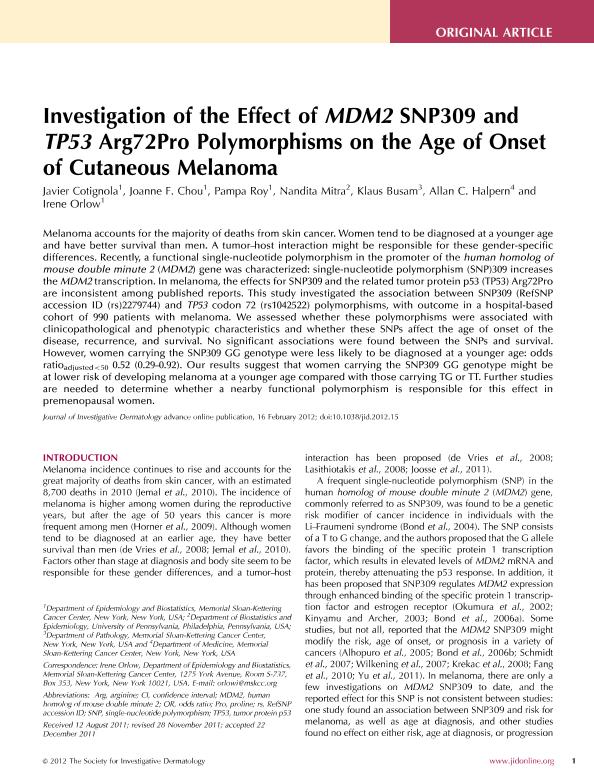Mostrar el registro sencillo del ítem
dc.contributor.author
Cotignola, Javier Hernan

dc.contributor.author
Chou, Joanne F.
dc.contributor.author
Roy, Pampa
dc.contributor.author
Mitra, Nandita
dc.contributor.author
Busam, Klaus
dc.contributor.author
Halpern, Allan C.
dc.contributor.author
Orlow, Irene
dc.date.available
2018-09-26T18:37:10Z
dc.date.issued
2012-05
dc.identifier.citation
Cotignola, Javier Hernan; Chou, Joanne F.; Roy, Pampa; Mitra, Nandita; Busam, Klaus; et al.; Investigation of the effect of MDM2 SNP309 and TP53 Arg72Pro polymorphisms on the age of onset of cutaneous melanoma; Nature Publishing Group; Journal Of Investigative Dermatology; 132; 5; 5-2012; 1471-1478
dc.identifier.issn
0022-202X
dc.identifier.uri
http://hdl.handle.net/11336/60950
dc.description.abstract
Melanoma accounts for the majority of deaths from skin cancer. Women tend to be diagnosed at a younger age and have better survival than men. A tumor-host interaction might be responsible for these gender-specific differences. Recently, a functional single-nucleotide polymorphism in the promoter of the human homolog of mouse double minute 2 (MDM2) gene was characterized: single-nucleotide polymorphism (SNP)309 increases the MDM2 transcription. In melanoma, the effects for SNP309 and the related tumor protein p53 (TP53) Arg72Pro are inconsistent among published reports. This study investigated the association between SNP309 (RefSNP accession ID (rs)2279744) and TP53 codon 72 (rs1042522) polymorphisms, with outcome in a hospital-based cohort of 990 patients with melanoma. We assessed whether these polymorphisms were associated with clinicopathological and phenotypic characteristics and whether these SNPs affect the age of onset of the disease, recurrence, and survival. No significant associations were found between the SNPs and survival. However, women carrying the SNP309 GG genotype were less likely to be diagnosed at a younger age: odds ratioadjusted<50 0.52 (0.29-0.92). Our results suggest that women carrying the SNP309 GG genotype might be at lower risk of developing melanoma at a younger age compared with those carrying TG or TT. Further studies are needed to determine whether a nearby functional polymorphism is responsible for this effect in premenopausal women.
dc.format
application/pdf
dc.language.iso
eng
dc.publisher
Nature Publishing Group

dc.rights
info:eu-repo/semantics/openAccess
dc.rights.uri
https://creativecommons.org/licenses/by-nc-sa/2.5/ar/
dc.subject
Melanoma
dc.subject
Polymorphism
dc.subject
Mdm2
dc.subject
Tp53
dc.subject.classification
Otras Ciencias Biológicas

dc.subject.classification
Ciencias Biológicas

dc.subject.classification
CIENCIAS NATURALES Y EXACTAS

dc.title
Investigation of the effect of MDM2 SNP309 and TP53 Arg72Pro polymorphisms on the age of onset of cutaneous melanoma
dc.type
info:eu-repo/semantics/article
dc.type
info:ar-repo/semantics/artículo
dc.type
info:eu-repo/semantics/publishedVersion
dc.date.updated
2018-09-24T13:50:27Z
dc.journal.volume
132
dc.journal.number
5
dc.journal.pagination
1471-1478
dc.journal.pais
Reino Unido

dc.journal.ciudad
Londres
dc.description.fil
Fil: Cotignola, Javier Hernan. Consejo Nacional de Investigaciones Científicas y Técnicas; Argentina. Memorial Sloan Kettering Cancer Center; Estados Unidos
dc.description.fil
Fil: Chou, Joanne F.. Memorial Sloan Kettering Cancer Center; Estados Unidos
dc.description.fil
Fil: Roy, Pampa. Memorial Sloan Kettering Cancer Center; Estados Unidos
dc.description.fil
Fil: Mitra, Nandita. University of Pennsylvania; Estados Unidos
dc.description.fil
Fil: Busam, Klaus. Memorial Sloan Kettering Cancer Center; Estados Unidos
dc.description.fil
Fil: Halpern, Allan C.. Memorial Sloan Kettering Cancer Center; Estados Unidos
dc.description.fil
Fil: Orlow, Irene. Memorial Sloan Kettering Cancer Center; Estados Unidos
dc.journal.title
Journal Of Investigative Dermatology

dc.relation.alternativeid
info:eu-repo/semantics/altIdentifier/doi/https://dx.doi.org/10.1038/jid.2012.15
dc.relation.alternativeid
info:eu-repo/semantics/altIdentifier/url/https://www.sciencedirect.com/science/article/pii/S0022202X15357511
Archivos asociados
